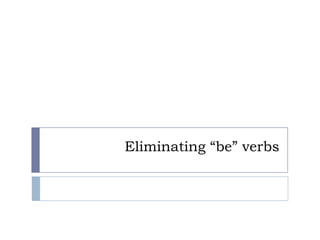
Be verbs eliminate
- 2. SUBSTITUTE Sometimes a good replacement just pops into your brain. For example, instead of “That cherry pie sure is good,” substitute the “to-be” verb is with tastes as in “That cherry pie sure tastes good.”
- 3. REARRANGE Start the sentence differently to see if this helps eliminate a “to-be” verb. For example, instead of “The monster was in the dark tunnel creeping,” rearrange as “Down the dark tunnel crept the monster.” (Note: this revision results in passive voice, how could you revise to eliminate the “be” verb without using passive voice?)
- 4. CHANGE ANOTHER WORD Change another word in the sentence into a verb-For example, instead of “Charles Schulz was the creator of the Peanuts cartoon strip,” change the common noun creator to the verb created as in “Charles Schulz created the Peanuts cartoon strip.”
- 5. COMBINE SENTENCES Combine sentences-Look at the sentences before and after the one with the “to-be” verb to see if one of them can combine with the “to-be” verb sentence and so eliminate the “to-be” verb. For example, instead of “The child was sad. The sensitive young person was feeling that way because of the news story about the death of the homeless man,” combine as “The news story about the death of the homeless man saddened the sensitive